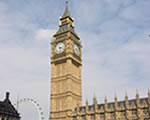 Go to main content
Go to main content
Archive Website of the UK government
Please note that this website has a UK government accesskeys system.
Main menu
Page menu
Money, tax and benefits

 Income Tax when arriving in the UK
Income Tax when arriving in the UK

When you come to live or work in the UK, the UK Income Tax you'll pay depends on how long you'll be here and whether you intend to live here permanently. There are special rules for entertainers, students, teachers and sports people.
Will you have to pay UK Income Tax?
The UK Income Tax you'll pay depends on whether you're 'resident', 'ordinarily resident' or 'domiciled' in the UK. You can be more than one of these - or none.
Resident
- if you're in the UK for 183 days or more in a tax year, you're resident for that year for tax purposes
- if you come to live in the UK permanently or to remain for three years or more you're resident from the date of arrival
- you're also treated as resident if you're in the UK for an average of 91 days or more in a tax year - worked out over a maximum of four consecutive tax years
Ordinarily resident
- if you're resident in the UK year after year you will normally be treated as ordinarily resident
- you're treated as ordinarily resident in the UK from the date you arrive if it's clear that you intend to stay for at least three years
Domiciled
- your domicile is normally acquired at birth, but this is a general law concept covering a range of factors
What you'll pay Income Tax on
If you're both resident and ordinarily resident
You'll pay Income Tax on all your income from:
- work you do in the UK
- UK pensions
- UK investments
If you're UK domiciled you'll also pay tax on all your overseas income - but you may be entitled to a ten per cent deduction from the amount due on overseas pensions.
If you're not UK domiciled you'll usually pay tax only on overseas income you bring into the UK. But you'll pay tax on:
- all your earnings if you work overseas for a UK employer
- all your earnings if you do some work in the UK for an overseas employer
- 90 per cent of a pension from the Republic of Ireland - unless it's an Irish government pension and you are a UK national
Also read later section 'If you already pay tax on your overseas income'. There are special tax allowances for:
- seafarers who spend long periods outside the UK
- people who get overseas pensions
If you're resident but not ordinarily resident
If you're resident but not ordinarily resident you'll pay tax on all your UK income. You can usually pay tax only on overseas income you bring into the UK. But you'll pay tax on 90 per cent of a pension from the Republic of Ireland - unless it's an Irish government pension.
You'll pay tax on earnings for work done abroad that you bring into the UK.
If you're not resident
You'll pay tax on your income from:
- work you do in the UK
- UK pensions
- UK investments
- rental income from UK property
You won't pay tax on your overseas income even if you bring it into the UK.
Income Tax allowances
All UK residents get personal tax-free allowances to reduce their tax.
Do you need to complete a tax return?
If the income you pay tax on is more than your allowances, you may be able to pay the tax through PAYE (Pay As You Earn) if you're employed. If you're not employed, you'll need to complete a tax return.
Coming into the UK part way through the year
When you come to the UK part way through a tax year you'll normally only pay tax on income you get after you arrive if:
- you come to the UK to stay for at least two years or to take up permanent residence
- you weren't ordinarily resident in the UK before you arrived
Otherwise you may have to pay UK tax on your income for the whole year. Either way, you'll always get your full year's Personal Allowance.
If you already pay tax on your overseas income
The UK has 'double taxation agreements' with many other countries to make sure that you don't pay tax twice on the same income.
Even if there's no agreement, you can usually still claim a reduction for any overseas tax you've paid.
More useful links
Useful contacts
Provided by HM Revenue and Customs
 Facebook
Facebook Twitter
Twitter StumbleUpon
StumbleUpon Delicious
Delicious Reddit
Reddit